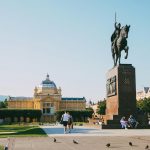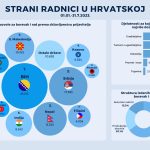ZAGREB, April 24, 2018 – A conference and roundtable discussion entitled “Between Fear and the Truth – Facing the Communist Past in Southeast Europe”, organised by the Konrad Adenauer Foundation from Bucharest and the Croatian Catholic University from Zagreb, started in Zagreb on Tuesday, with speakers warning that compared to neighbouring countries, Croatia has not adopted an institutional framework to resolve that problem.
The host of the conference, Croatian Catholic University Chancellor and member of the Council for Facing the Consequences of Undemocratic Regimes Željko Tanjić, underscored that the purpose of the conference was to continue cooperation and talks on important issues concerning facing the past in Croatia, particularly crimes and violations of human rights committed in the period from 1945 to 1990 under the communist rule.
Countries in the neighbourhood dealt with that problem and adopted an institutional framework to resolve it, however, in Croatia that has not happened and an important objective of the conference is building an institutional framework for facing the past.
Numerous people were imprisoned, stripped of their rights or killed and denied the possibility to participate in building society because they thought differently, Tanjić said and added that only two people from Croatia had answered for that, and they were both tried in Germany for crimes committed in that country.
The president of the Croatian Academy of Sciences and Arts and of the Council for Facing the Consequences of Undemocratic Regimes Zvonko Kusić presented the results of the council’s work, noting that the council was the first body in Croatia that faced those issues in a serious, interdisciplinary and balanced way.
He presented parts of a document relating to communist crimes, underscoring that when they referred to the anti-fascist struggle, communist symbols were considered acceptable but could be contentious when referring to periods and situations when crimes were committed or human rights were violated.
Kusić recalled that all council members had agreed on the general text of the document whereas with regard to the part containing legal recommendations to state institutions, there were dissenting opinions.
Despite those dissenting opinions, the council’s work was successful while the part of the document containing legal recommendations was challenged from both sides of the ideological spectrum, said Kusić. Critics of the document believe that the solution to the problem lies in condemning the other side, which is not a balanced approach. One of the members of the council has said that 80% of the population would sign the document, Kusić added.
Hartmut Rank of the Konrad Adenauer Foundation from Bucharest and the German Ambassador to Croatia, Thomas E. Schultze, welcomed the conference.
Speakers at the conference included the director of the Institute for Democracy, Media and Culture from Tirana – Albania Jonila Godole, the director of the Study Centre for National Reconciliation in Slovenia Andreja Valič Zver, Catalin Constantinescu from the Institute for the Investigation of Communist Crimes and Memory of the Romanian Exile, and Dr. Karsten Duemmel, the director of the Konrad Adenauer Foundation in Bosnia and Herzegovina.







